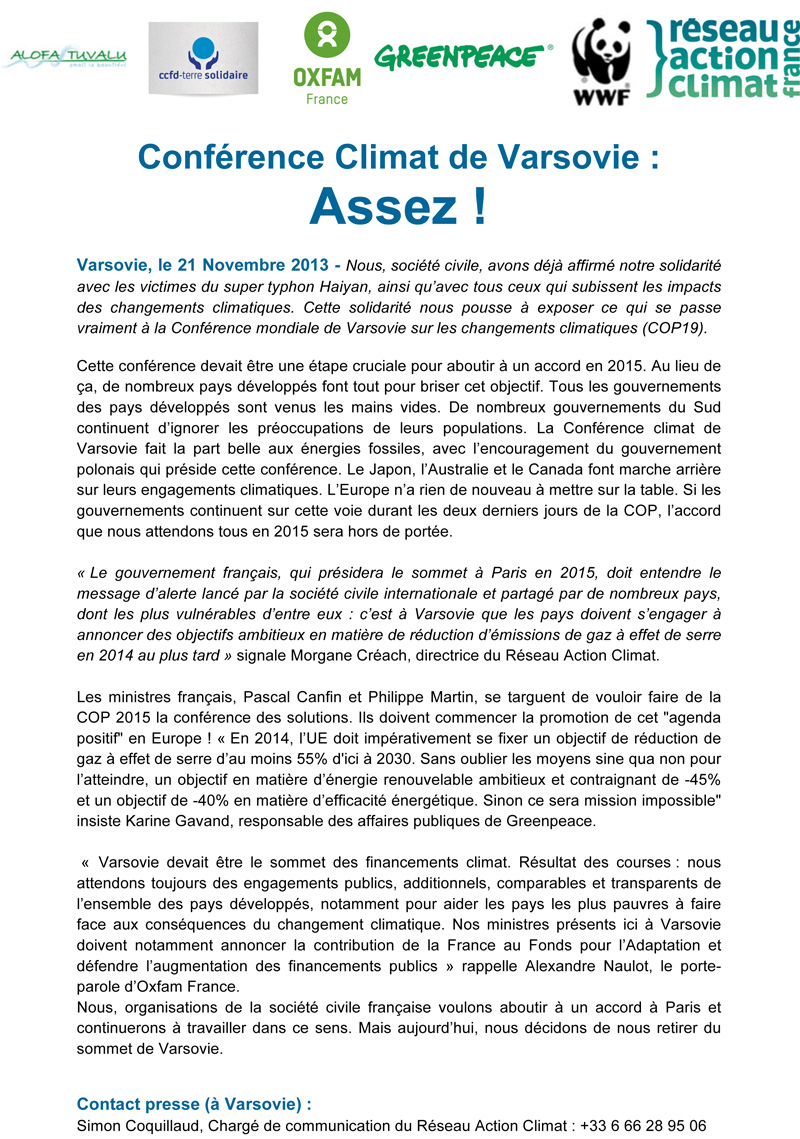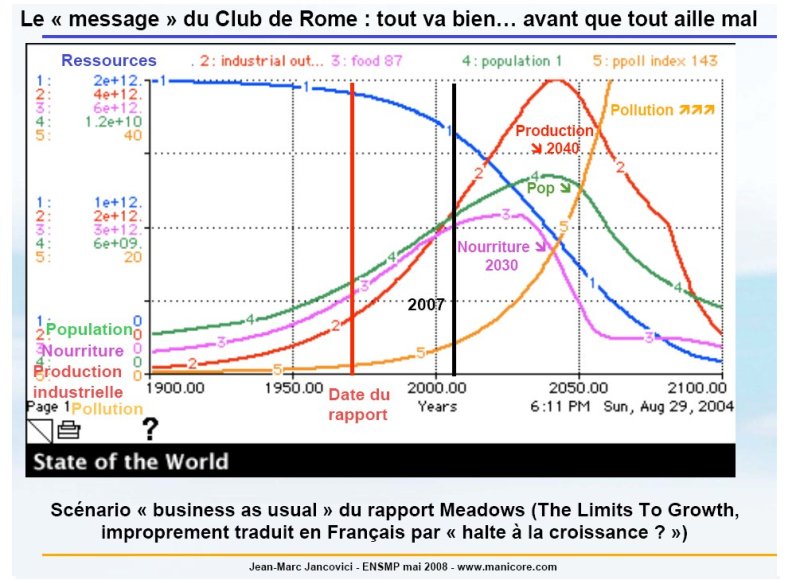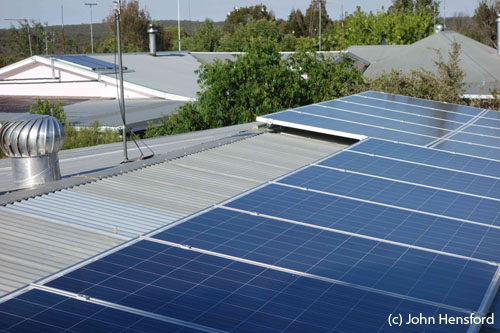
![]() John said:
John said:
I cant remember whether I mentioned or not that I had installed a grid-connected solar power system. The opportunity came up unexpectedly to make an arrangement with a small power company to sell them my excess power at 30 cents/kWh, compared to 34.2 cents buying from them. I installed a 5kW system (20 panels). I would like to have gone bigger but that was all that the power company permitted (they want one to draw some power from them).
They will supposedly install a new meter soon that shows power production and power consumption and offsets one against the other. For time being I still have my old meter; it spins backwards when the sun is shining. Thrilling to see that! Yesterday my net consumption was minus 8kWh. My running average daily consumption for two months was 0.6kWh but having family here at Xmas and using air-conditioning on one rather hot night, and doing lots of cooking, suddenly pushed up the daily average to 2.3kWh. Nevertheless, that is far lower than before. I calculate that I have saved $925 in the three months since installation. Payback would take about four years on present figures but will be longer taking into account the lower angles of sunlight and shorter days in Winter.
We made the decision to install the panels flat on the roof of our shed which is only sloped at 20 degrees to horizontal. It would be better to have them at about 35 degrees but that would have required a more expensive supporting framework. The increased efficiency would probably not have justified the extra cost. Anyway, it was not an option as the installers didnt have the materials for such a frame. More importantly, my wife said I absolutely dont want ugly panels sticking up in the air. So that was that!
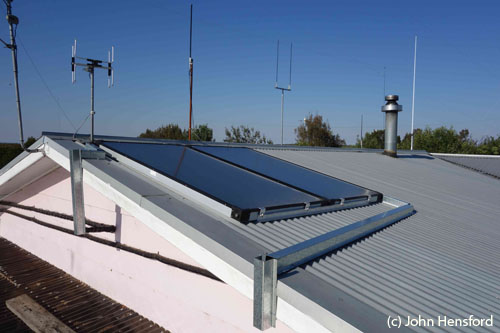
I also installed a solar hot water system. After looking at the various options, including heat pump and evacuated tube systems, I went for a conventional solar panel system but with the tank at ground level (connected to the panels through a heat exchanger).
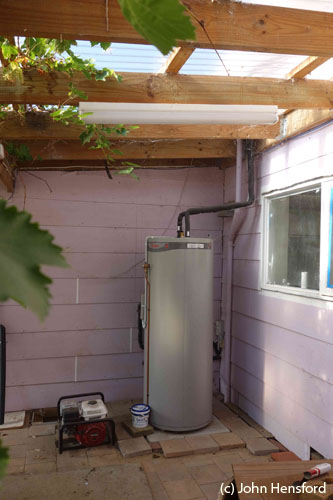 The tank has a booster element connected to our existing off-peak power supply. In three months weve used 43kWh of off-peak power at 20 cents/kWh but most of that was consumed on Xmas and Boxing Days when the house was full of kids showering. When just my wife and I are at home the off-peak meter hardly changes from one week to the next. The payback time will be at least nine years, so its not really an economic proposition in our situation where off-peak power is available but, what the heck, I did it anyway!
The tank has a booster element connected to our existing off-peak power supply. In three months weve used 43kWh of off-peak power at 20 cents/kWh but most of that was consumed on Xmas and Boxing Days when the house was full of kids showering. When just my wife and I are at home the off-peak meter hardly changes from one week to the next. The payback time will be at least nine years, so its not really an economic proposition in our situation where off-peak power is available but, what the heck, I did it anyway!
I have in mind to install more solar panels. I wont be able to connect them to grid because of the power companys policies but I will be able to use the power in other ways to reduce overall consumption. I dont want to use batteries because standalone solar systems are so expensive. What I have in mind is to use direct loading. Our waterbed is a significant consumer of power (I have been measuring it) even though I recently installed a new, supposedly more efficient heater. The consumption isnt really a concern at present because I have at time clock on the heater circuit that only allows power during full daylight hours. Nevertheless, if I can connect panels directly to the heater it will allow more power to go to the grid during the day, bringing our production close to equalling what we draw from the grid at night.
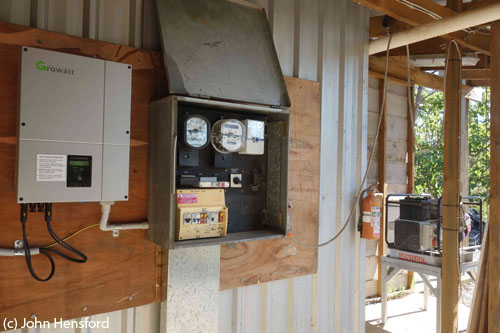
Matching the panels and the load is not straightforward. I want to understand it all better so I have decided to take advantage of a living with solar course offered by the Rainbow Power Company (www.rpc.com.au) in a few weeks. That company has its business at Nimbin in northern NSW, an area that has a plethora of alternative living people (hippies as they used to be called when that term was in vogue). It should be an interesting course.
![]() Alofa Tuvalu counterpart in the US and an architect specialized in environment, Chris said: So great that you have embraced solar at home. Yeah...with all its own ins and outs, it can be a pain at first to adjust...but longer term, it's the right, smart move...and it sounds like you are rapidly becoming an expert, as you always do with things that capture your attention. Funny about the longer payback on the hot water system...it's just the opposite here in California. Payback is MUCH quicker for hot water...especially with new state subsidy. But there are so many variables from place to place... In any case...way to go! Will be interested in hearing of your continuing solar adventures. When are you converting to an electric car ??? (sorta just joking re that one... your distances are likely too great.... but maybe an electric scooter?)
Alofa Tuvalu counterpart in the US and an architect specialized in environment, Chris said: So great that you have embraced solar at home. Yeah...with all its own ins and outs, it can be a pain at first to adjust...but longer term, it's the right, smart move...and it sounds like you are rapidly becoming an expert, as you always do with things that capture your attention. Funny about the longer payback on the hot water system...it's just the opposite here in California. Payback is MUCH quicker for hot water...especially with new state subsidy. But there are so many variables from place to place... In any case...way to go! Will be interested in hearing of your continuing solar adventures. When are you converting to an electric car ??? (sorta just joking re that one... your distances are likely too great.... but maybe an electric scooter?)
![]() John said: I must admit I didnt directly take into account the subsidies available for solar systems. They were taken off the prices that I had to pay for the two systems. My payback calculations were on net price basis as thats what mattered most to me. Still, I think that is a correct way of calculating, or have I missed something?
John said: I must admit I didnt directly take into account the subsidies available for solar systems. They were taken off the prices that I had to pay for the two systems. My payback calculations were on net price basis as thats what mattered most to me. Still, I think that is a correct way of calculating, or have I missed something?
With solar hot water the calculation would no doubt be very different if there were more people living in my house. We could have installed a more modest system that would have met our requirements 95% of the time. That would have paid back much more quickly I suppose.
Offpeak power here is about 60% the cost of peak power so is quite an economical way of heating water. My average cost was about $1.49 per day. Now its virtually nothing, but it takes a long time to recoup capital cost at $1.49 per day!
Something I am watching carefully is use of air-conditioning. My Xmas scare wasnt so bad as I thought. My wife has just told me that the grandkids switched on a heat lamp in the main bathroom and left it on all night. They flipped the wrong switch - heap lamp instead of light. Its a good thing I didnt find out at the time; I might have been a little upset! Anyway, it was good in the sense that it has made me very wary of using air-conditioning. As you know, we ceased using any air-conditioning in Tuvalu last year, which made a huge reduction in consumption. Here in southern Australia theres not the same need for air-conditioning anyway, and in addition our houses are much better insulated that Tuvaluan houses. Admittedly it is Summer now and if we get the very high temperatures that some parts of Australia are experiencing I may have to concede a little cooling. However, yesterday it was 36.5C here and I didnt feel the need for aircon. Perhaps thats a legacy of having lived in the tropics so long! Its also a question of humidity. Its low here and feels much cooler than the average day in Tuvalu, despite being about five degrees hotter here than the average in Tuvalu.
Electric car? Huh, if I went to the local shops I would need to plug in and recharge before I could come home! Electric scooter? Possible I think, but not much fun riding one our dusty, unsealed roads around here.
![]() Chris said: If you calculated on a "net price paid", including any subsidy, then that would seem an accurate way to do it. When calculating economics of solar projects, it's important to include the value of any subsidy that is available...as it can completely affect the viability of any given project. Germany and Spain built their entire solar industries in this fashion, offering the equivalent of enormous subsidies by paying way over the market price of conventional power to solar/alt energy producers feeding power into the grid...so called "feed-in tariffs". This caused some problems later when fit's were lowered later, but the ones in early -- at both personal and commercial scale -- made out very well. And this is how Germany, with its many grey days, became the #1 installed solar power producer in the world...!!
Chris said: If you calculated on a "net price paid", including any subsidy, then that would seem an accurate way to do it. When calculating economics of solar projects, it's important to include the value of any subsidy that is available...as it can completely affect the viability of any given project. Germany and Spain built their entire solar industries in this fashion, offering the equivalent of enormous subsidies by paying way over the market price of conventional power to solar/alt energy producers feeding power into the grid...so called "feed-in tariffs". This caused some problems later when fit's were lowered later, but the ones in early -- at both personal and commercial scale -- made out very well. And this is how Germany, with its many grey days, became the #1 installed solar power producer in the world...!!
everything you describe re your house is part of what i call "the solar learning curve"...learning how to adapt one's habits to an entirely new way of energy production and management. there are just a bunch of new details to learn to maximize system efficiency. when designing a new house, for example, from the ground up, some of these have nothing at all to do with equipment but rather with actual design....the kinds of materials used, the orientation of the building, where windows are placed, where and what kind of landscaping is used to provide shade where needed, etc, etc. This latter category is known as "passive design"...all the things you can do WITHOUT active solar systems to maximize energy efficiency and living comfort. Intelligence with passive measures can radically reduce the need for the more costly active ones... Example: roof overhangs designed to utilize season sun-angles to shade windows in summer when sun is high, but to allow sun in in winter to help heat house. etc etc etc....there are hundreds of such "tricks" to work WITH nature and site specifics....
one point of interest to me: designing this way is both VERY MODERN in terms of learning how to best maximize efficiency and reduce footprint....but in many ways also ANCIENT in terms of working with nature, something which successful societies have done since time began!
re the electric car idea....sounds premature for your situation, but eventually there will be effective enough storage and longer available ranges to take advantage of all the electricity you are producing...
it all sounds like great fun for you...a kind of living experiment as you make the big transition...and, over the longer haul, save a good deal of $$ while you're at it !! all best.
A confession: I hesitated to even send this email.
The thing Im writing about today -- a trade agreement called the Trans-Pacific Partnership, or TPP -- is a bit outside 350.org's wheelhouse. When it came down to it though, I couldnt NOT send this email, since the TPP is shaping up to be the worst kind of corporate power grab.
This week, Wikileaks released newly leaked documents that confirm the worst: the United States' TPP negotiating team is walking away from supporting strong environmental safeguards. Without protections for land use, logging, and climate pollution, the TPP has gone from a bad deal to a disastrous one. It's time to take action:
Click here to tell your Members of Congress to reject the Trans-Pacific Partnership.
The TPP is an expansive, highly secretive international free trade agreement. It's being negotiated by delegates from twelve Pacific Rim countries, including the United States, along with hundreds of industry leaders. Elected officials, civil society, and the press have largely been shut out of negotiations, but these leaked documents reveal disturbing provisions.
The TPP would empower corporations to directly sue governments over laws and policies that they claim reduce their profits. Legislation designed to address climate change, curb fossil fuel expansion, and reduce air pollution could all be subject to attack as a result of the TPP.
Right now, our best chance to stop this train wreck is to stop Congress from giving fast-track authority to President Obama, allowing him to push the agreement through without a public debate.
Click here to tell your Congressional representatives to reject fast track and the Trans-Pacific Partnership.
In Australia, New Zealand, Peru, Malaysia, Vietnam, Singapore, and here in the U.S., citizens have taken to the streets in mass protest. Last year, 130 members of Congress voiced concerns about the TPP, and opposition is growing now that a fast-track bill has been introduced in the Senate. Let's make sure those Senators and Representaives who may be on the fence get our message loud and clear:
We oppose the "fast-track" bill, and we reject the TPP.
Any trade agreement that gives corporations unfettered power is a bad one, but a trade agreement like this would be a disaster for people and the planet.
Onward,
Phil
350.org is building a global movement to solve the climate crisis. Connect with us on facebook and Twitter.

2013 is coming to a close, the 10th year since our first trip to Tuvalu and our uninterrupted campaigns to fight Climate Change*.
In November 2013, as the planet hit a record heat, over 40 years since the Stockhom meeting and first reports, the 19th CoP took place in Poland (see our CoP15 video)
To divertingly illustrate what international happenings feel like i.e.: hot air we chose to recycle our biogas leaflet cover (thanks to our friend Kent).
For 2014, our planetary wish is for all leaders to get serious And, for all and each of you, well stay on the entertaining field with John Lennons All we need is love and wish you : love, care, share humanity.
The Alofa Tuvalu Paris office
*below is a one page overview of what 2013 was made of for us.
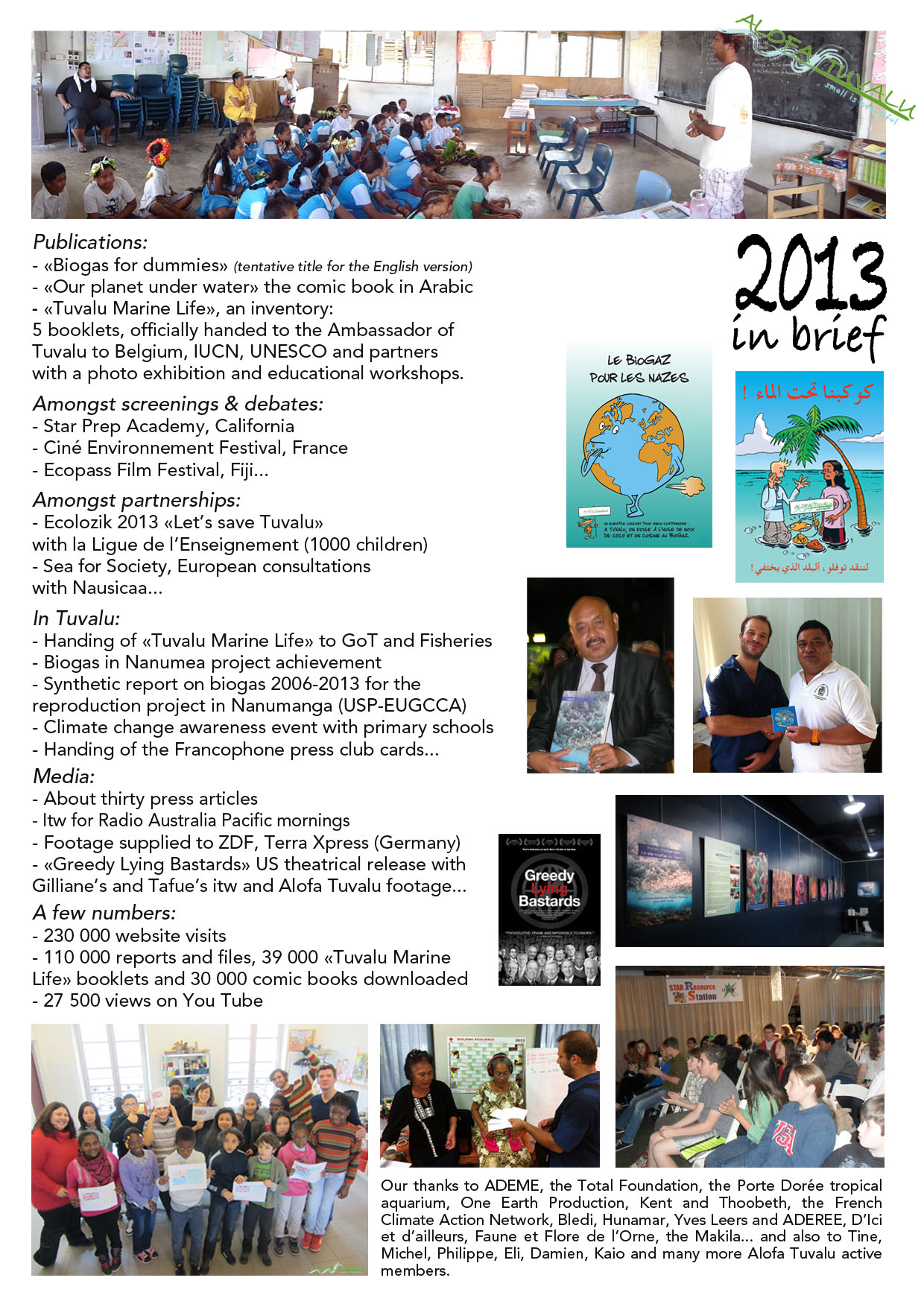

2013 sachève, la 10ème année depuis notre premier voyage à Tuvalu et nos campagnes ininterrompues depuis contre les changements climatiques*.
Au mois de novembre, le plus chaud jamais enregistré, plus de 40 ans après la conférence de Stockholm et les premiers rapports, la CoP19, le rendez-vous annuel international sur le climat, se déroulait en Pologne. (Voir notre vidéo sur la CoP15))
Pour illustrer ce quévoquent ces grands raouts, nous avons choisi, pour nos voeux 2014, en clin doeil, de recycler la couverture de notre livret sur le biogaz (merci Kent !).
Un souhait global : que les dirigeants de la planète fassent preuve dun peu de sérieux
Et pour tous et chacun de vous, restons sur le terrain du divertissement avec le all we need is love de John Lennon et un voeu : amour, partage et humanité.
Le bureau parisien dAlofa Tuvalu
*ci-dessous un aperçu de nos activités 2013

On Thursday November 21 2013, Unions and international NGOs decided to leave the COP19 negociations. The objective : to protest, in solidarity with the victims of Climate Change facing the steps backward of gathered countries in Warsaw : (Japan climbing down, Australian crises, firing of the Polish Environment Minister replaced with a pro shale gas) and to send a strong message : enough is enough ! Alofa Tuvalu, as part of the Board of the Climate Action Network France (RAC), is very proud of this strong demonstration of our common deep disappointment,
Gilliane
Warsaw Climate Conference of the Parties : ENOUGH !
The NGOs joint statement:
Organizations and movements representing people from every corner of the Earth have decided that the best use of our time is to voluntarily withdraw from the Warsaw climate talks. Instead, we are now focusing on mobilizing people to push our governments to take leadership for serious climate action.
We have said we stand in solidarity with the millions impacted by Typhoon Haiyan, and with all climate impacted people. Our solidarity compels us to tell the truth about COP 19 the Warsaw Climate Conference.
In fact, the actions of many rich countries here in Warsaw are directly undermining the UNFCCC itself, which is an important multilateral process that must succeed if we are to fix the global climate crisis.
The Warsaw Conference started off on the wrong foot, with a Coal & Climate Summit being held in conjunction, corporate sponsorship from big polluters plastered all over the venue, and a Presidency that is beholden to the coal and fracking industry. Things only got worse during the first week, when Japan announced that it was following Canada and backtracking on mitigation commitments previously made, and Australia gave multiple signals that it was utterly unwilling to take the UN climate process seriously.
This week saw a finance ministerial with almost no actual finance, and loss and damage talks that have stalled because rich countries refuse to engage on substance. Warsaw has not seen any increase in emission reductions or support for adaptation before 2020 and on many of these things it has actually taken us backward. And a clear pathway to a comprehensive and fair agreement in Paris 2015 is missing.
We as civil society are ready to engage with ministers and delegations who actually come to negotiate in good faith. But at the Warsaw Conference, developed country governments have come with nothing to offer. Developing country governments are also failing to stand up for the needs and rights of their people. Australian Prime Minister Tony Abbott posted a video to mark the opening of the 44th parliament, saying the adults are back in charge, as he seeks to abolish the carbon tax.
It is clear that if countries continue acting in this way, the next two days of negotiations will not deliver the climate action the world so desperately needs.
Therefore, organizations and movements representing people from every corner of the Earth have decided that the best use of our time is not to further engage in the Warsaw climate talks. Instead, we are now going back to mobilize people to push our governments to take leadership for serious climate action. We will work to transform our food and energy systems at a national and global level and rebuild a broken economic system to create a sustainable and low-carbon economy with decent jobs and livelihoods for all. And we will put pressure on everyone to do more.
Coming out of the Warsaw Climate Conference, it is clear that without such pressure, our governments cannot be trusted to do what the world needs. We will return with the voice of the people in Lima to hold our governments accountable to the vision of a sustainable and just future.
We are an NGO based out of Japan and Tuvalu called Tuvalu Overview (http://www.tuvalu-overview.tv/ eng/). We are contacting you as we would like to share an important message from the Prime Minister of Tuvalu regarding Japan's possible use of nuclear power.
In September this year, Nobuteru Ishihara, Japan's Minister of the Environment / Minister of State for the Nuclear Emergency Preparedness, visited Tuvalu, took a tour around the island and spoke with the country's Prime Minister Hon. Enele Sopoaga. There, both countries' PMs gained consensus on the fact that island countries are particularly vulnerable to the adverse effects of climate change and that climate change is a matter of life-and-death for the people and the country's existence itself. After this visit, we had an opportunity to speak with Tuvalu's PM Sopoaga concerning Japan's possible use of nuclear power.
The video message for media is the following: http://youtu.be/biGrA2rQD7E
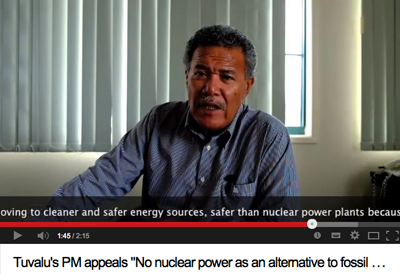
Japan's Minister Ishihara will soon arrive at the COP19 and officially announce the country's mid-term reduction target. This figure that is about to be officially announced has already been criticized as a major step backward and many has called for a revision. On a relevant note, Tuvalu's PM appeals not to consider nuclear power as an alternative to fossil fuels, and we feel that it is important to share this message.
If you have any questions on the matter, please feel free to contact us at info@tuvalu-overview.tv
Regards,
Mr. Shuuichi Endou
President of NGO Tuvalu Overview
Tuvalu environmental goodwill ambassador
<Tuvalu's PM appeals.pdf>
遠藤 秀一
ツバル国環境親善大使
NPO法人 Tuvalu Overview 代表理事
〒110-0001 台東区谷中7-5-5-201
TEL 03-5834-1456 FAX 03-3821-7898
http://tuvalu-overview.tv/
EU and big polluters ignore climate action pushing to expand carbon markets at COP19
Brussels, 7th November 2013
The EU aims to expand carbon markets that would benefit big polluters at the UN climate talks, COP19 in Poland, says a Statement signed by 135+ groups, movements and networks from all over the world. The Statement denounces the corporate capture of COP19 by the same companies that stand to profit.
The European Commission and the carbon crooks who turn profits from the failing EU ETS are pushing for a lifeline through linking up markets, foreshadowing a global carbon market, stated Tamra Gilbertson from Carbon Trade Watch.[1]
COP19 partners, explains the statement, include Polish energy group PGE, whose Belchatow coal-fired plant was the biggest polluter and the biggest recipient of free allowances in 2012.[2] COP19 will be the most extreme case of corporate capture we have seen within the COP, according to Belén Balanyá from Corporate Europe Observatory, The Polish government has granted partner status to eleven companies, among them climate culprits with horrendous track records such as ArcelorMittal, the biggest beneficiary from the EU ETS, and auto maker BMW who are blocking EUs attempts to reduce emissions from cars for decades.
The statement highlights the links between the Polish Ministery of Economy and the coal industry, who are organising a Coal and Climate Summit in parallel to the climate talks. The cooperation between the coal industry and the Polish government is blatant says Maxime Combes from Attac France, they have drafted a communiqué promoting coal as a solution to the climate crisis. Coal is one of the dirtiest energy sources, fuelling climate change. Rather than consuming coal and fossil fuels, EU countries should enable a just transition to a post-fossil fuel society. It is time to scrap the ETS and other attempts to commodify nature, time to leave fossil fuels and minerals in the ground, and time to start a real transition towards just and people-driven alternatives.
Read the statement: English | Español | Français
For more information contact:
- Tamra Gilbertson, Carbon Trade Watch (Spain 0034 625498083)
- Maxime Combes, Attac France, (France, 0033 624512944)
- Belén Balanyá, Corporate Europe Observatory (Netherlands 0031 633090386)
- Lyda Fernanda Forero, Transnational Institute (Netherlands 0031 685086340)
[1] Discussions on the Framework for Various Approaches (FVA) would be the first step towards allowing the trading of permits from different emissions trading schemes (dangerously including permits created outside of the UNFCCC) to be used for compliance with targets under the Convention. Many industrialised countries see this as a paving stone to a global carbon market.
[2] EU ETS emissions dropped by 1.4% in 2012, ENDS Europe, 2 April 2013, http://www.endseurope.com/31222/
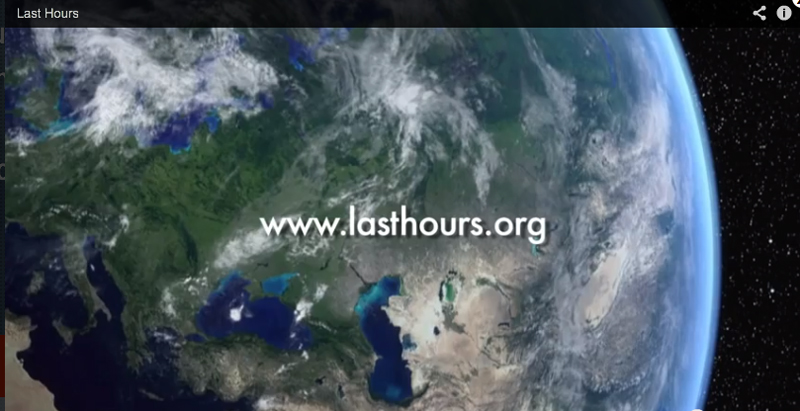
In less than a year, world leaders will be gathering at the United Nations to address the climate crisis and to set the ambition levels for international action on climate change. Send them a strong message:
"The climate is becoming dangerously imbalanced due to human interference, and the choices we make in the next two years will determine our future. Now is our moment, before climate disruption becomes irreversible, to stand up for the safety and wellbeing of people at home and around the world."
Watch the video "Last Hours" narrated by Thom Hartmann about the "time bomb" that is ticking underground, underwater and under ice frozen methane that is now escaping and could trigger runaway climate change. Visit http://lasthours.org
Take action !
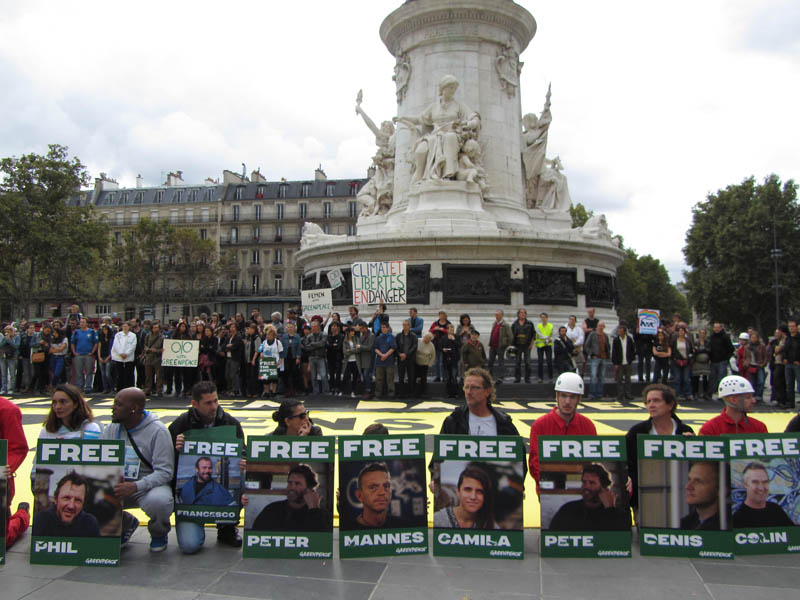
160 événéments dans 48 pays. Samedi 5 octobre, des milliers de personnes se sont mobilisées avec nous pour demander la libération des 30 de lArctique, toujours emprisonnés en Russie.
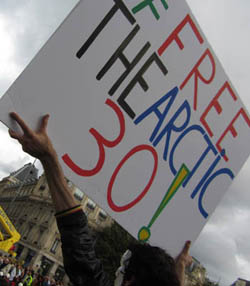
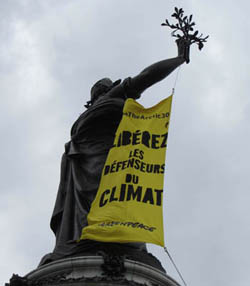
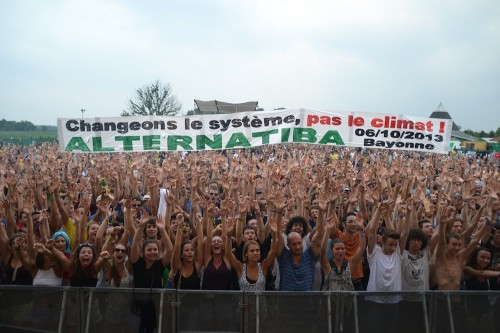
À 10H, la conférence plénière "Ensemble, construisons un monde meilleur en relevant le défi climatique" avec Christophe Cassou (climatologue), Patrick Viveret (philosophe) et Geneviève Azam (maître de conférences en économie et chercheuse)
À 14H, la conférence plénière "Face à la crise sociale et écologique, quels changements dans l'économie et la société ?" avec notamment Corinne Morel Darleux (coordonnatrice de l'Abécédaire des radicalités concrètes), Jean-Marie Harribey (co-président des Economistes Atterrés) et Pierre Larrouturou (économiste, porte-parole du Collectif Roosevelt)
Et à 17H30, un hommage exceptionnel à Stéphane Hessel, le parrain d'Alternatiba, qui sera un temps fort sur l'engagement climatique, comprenant des moments politiques et artistiques forts, et notamment la participation de Mme Christiane Hessel, Juan Lopez de Uralde (activiste climatique arrêté à Copenhague en 2009, ancien directeur de Greenpeace Espagne), Jean-François Bernardini (chanteur d'I Muvrini), Christian Planque (de la Confédération Paysanne, proche de Stéphane Hessel), Germain Sarhy (fondateur du Village Emmaüs Lescar-Pau).
Et pour ceux et celles qui n'ont pas pu avoir de places au Forum sur le changement climatique du samedi 5 octobre, vous pourrez le suivre en direct sur le site du quotidien Sud-Ouest.fr
Merci de faire circuler ce message pour que des milliers et des milliers de gens puissent visionner cet événement, et ainsi participer à en faire un acte fondateur d'une nouvelle mobilisation citoyenne pour le climat!
Si les alternatives existent, qu'attend-on pour les mettre en place ?
L'équipe d'Alternatiba

Plus de mille personnes à pied doeuvre pour installer et faire vivre le Village des alternatives au changement climatique, en pleine actualité de la publication le 27 septembre du 5ème rapport du GIEC (résumé aux décideurs du Volet I) :
- 100 conférenciers dont de nombreuses personnalités ( Christophe Aguiton, Geneviève Azam, Eva Joly, José Bové, Annick Coupé, Jean-Marie Harribey, Hervé Kempf, Pierre Larrouturou, Corinne Morel Darleux, le climatologue du CERFACS Christophe Cassou, le co-fondateur de la Via Campesina Paul Nicholson, le président de NégaWatt Thierry Salomon, Patrick Viveret, etc.)
- 200 artistes
- 200 exposants
- 500 bénévoles
91 organisations et réseaux appelant à Alternatiba dont les Amis de la Terre-France et les Amis de la Terre-Espagne, ATTAC-France, Biocoop, le Collectif Roosevelt, la Confédération Paysanne, la FSU, Enercoop, la Fondation Danielle Mitterrand-France Libertés, la Fondation Nicolas Hulot, Greenpeace, la NEF, le Réseau Sortir du Nucléaire, Slow Food France, Surfrider Foundation Europe, Union Syndicale Solidaires, etc.
Des milliers de personnes attendues de toute la France et dune partie de lEurope.
Un évènement particulièrement visuel : le centre de Bayonne rendu piéton, chaque rue et place transformée en lieu dexposition et de démonstration des alternatives sociales et écologiques existant dores et déjà dans une quinzaine de domaines (agriculture et alimentation, éco-habitat, transports, consommation ou finance responsable, énergie, alternatives municipales et territoriales ). Des arts et du théâtre de rue, des repas de quartier, un marché paysan, une bourse aux vélos, une zone de troc, etc. le tout fonctionnant en monnaie locale.
Un espace climat sous un grand chapiteau de 1000 mètres carrés
Un important hommage à Stéphane Hessel, parrain du projet Alternatiba, en présence de son épouse et de nombre de ses proches, avec prises de paroles appelant à sengager pour relever le défi climatique et moments artistiques forts, devant des milliers de personnes. Un concert animé par les Motivés (musiciens et chanteurs de Zebda + invités) et dautres groupes.
Une journée qui se veut rampe de lancement pour une nouvelle dynamique de mobilisation populaire sur le climat dans la perspective de limportante COP21 (sommet onusien sur le changement climatique) qui se tiendra à Paris fin 2015.
Le site : Alternatiba
Le site de Kempf, "Reporterre", est le Mediapart (un autre qui a claqué la porte du Monde) de l'environnement :)
A votre bon coeur, si vous avez une petite pièce pour "Reporterre" ce serait génial...
En très bref:
- le rapport nous dit que le changement climatique est en marche et s'aggravera dans les années qui viennent
- les impacts sont déjà visibles: montée des mers, acidification des océans, démultiplication du nombre et de la violence des sécheresses.
- En 2012, les 800 évènements extrêmes recensés ont déplacé 32 millions de personnes, coûté 130 milliards de dollars en pertes économiques et trop de vies humaines (Sandy = 132).
- Le changement climatique coûte déjà 1,6% du PIB mondial chaque année
- La pollution de l'air et pourrait causer 3 millions de morts prématurées en 2100.
- Si nous n'agissons pas drastiquement et immédiatement, nous nous dirigeons vers le scénario le plus pessimiste (plus de 5°C). Soit un niveau de réchauffement auquel nous ne sommes pas forcément capable de nous adapter.
- Heureusement, les solutions existent - La Chine investit massivement, les villes au nord et au sud également. L'Allemagne a entamé sa transition énergétique et créé 380 000 emplois. Au Burkina, on construit une centrale solaire de 30 megawatt.
Toutes les solutions sont créatrices d'emploi, de bénéfices économiques et d'espoir.
Ce qui manque en France et ailleurs, c'est la volonté politique de changer les lois, d'adapter les budgets et la fiscalité.
François Hollande a 4 échéances proches pour changer la donne: la loi sur la transition énergétique, la loi de finance 2014, la loi de programmation sur le développement et la solidarité international et le prochain paquet énergie-climat européen.
Le résumé pour les décideurs est disponible ici : http://www.climatechange2013.org/images/uploads/WGIAR5-SPM_Approved27Sep2013.pdf
Le RAC crée un site pédagogique www.leclimatchange.fr

In December 2010, when a member of parliament crossed the floor, (i.e. went to the other party), the government in place since September, was replaced and a new PM, Willy Telavi, nominated.
Since then, Tuvalu experienced political feuds and court actions by the opposition. More tragically, 2 ministers died.
Last week, in August 2013, during a session of parliament, a vote of no confidence was delayed by a ministers resignation and brought a situation where the Prime Minister and the Governor General forced each other to resign their office.
On Sunday August 4th, Enele Sopoaga was nominated as Prime Minister and officially named on Tuesday August 6th 2013. A bye election for Nui is expected in Sept 2013 while the general election will be around Sept 2014.
Below is the situation described by Willy Telavi, before he was forced out.
........ OPPOSITION PARLIAMENT OF TUVALU - PRESS RELEASE ..........
The events surrounding the so called political crisis in Tuvalu as misreported in the mainstream media has been a great disappointment to the outgoing Government lead by Hon Willy Telavi and thus has the potential of compromising our reputation of a peaceful and democratic nation.
We would like to take this opportunity to set the record straight and advise the media of the sequence of events as they occurred.
Friday 28: - June Bye election for Nukufetau electorate concluded with Elisala Pita duly elected and joined the opposition. The Opposition then had the majority of 8 in the parliaments total seats of 15.
Saturday 29: - June Opposition met the Governor General in his office
Sunday 30 June -
Monday 01 July - Hon Willy Telavi (outgoing Prime Minister) met the Governor General and requested to have the parliament dates submitted following week to give time to talk with Speaker and one Minister who are to return to the country following week
Tuesday 02 July Opposition met the Governor General
Wednesday 03 July - Governor General exercised his powers to proclaimed parliament session to be held on 30 July without consulting the Prime Minister
Tuesday 30 July - Parliament met on Day one with Government Business on the agenda. The Opposition tried to move a motion to remove the government business and instead to be allocated as the private members day. The opposition had the feeling that they were being deprived of their rights to addressed parliament but after knowing the second day was allocated to them they were happy to listened and go by the agenda. Minister for Health resigned after some complications surfaced from his constituent Nui
Wednesday 31 July - A motion of no confidence was moved and the speaker explained that he could not allow parliament to proceed until the bye election for Nui has elected their MP. So the speaker adjourned the meeting for that reason. The Prime Minister did not have any involvement in this adjournment of the meeting.
In the afternoon the opposition submits a petition to the Governor General and a proclamation was issued by Governor General for parliament to re-convened on Friday to specifically deal with the motion of no confidence. The Prime Minister was never again consulted on this proclamation.
The Prime Minister emailed the Governor General to express his appointment for the above proclamation that was issued again with him knowing it when the speaker had adjourned the meeting. The Governor General responded saying that he was very disappointed with the speakers remarks made in parliament regarding Governor Generals proclamation of the 30 June meeting and also in addition to the petition by the Opposition and that was why he issued the second proclamation for Friday 2 August The Prime Minister requested an appointment with Governor General the following day 8.30am.
Thursday 01 August - The Prime Minister showed up at the Governor Generals office and was advised by security that Governor General was still in bed. The Prime Minister return home (1 minute away from Governor Generals residence) and not long the security came to advise Prime Minister that Governor General send his message that he was in bed for his headache. Prime Minister was trying to see the Governor General to resolve all these complications but was not given the chance.
Prime Minister met his cabinet members and given the incooperation of Governor General decided to remove Governor General. Prime Minister that morning in compliance to the requirement of the Constitution send twice a consulting letter to all MPs advising of his action. Following this the Prime Minister wrote a letter to HM the Queen in England recommending the removal of Governor General. Later that day the Governor General send a letter to the Prime Minister sacking the Prime Minister saying he was exercising his constitutional authority and his reserved powers and that the election of the new Prime Minister will be held on Saturday 4 August. Very interesting that in one incident in 2011 the Governor General wrote to the island of Nukufetau saying that he does not have any reserved powers. The Prime Minister maintained that the Governor General had exercised powers that he does not hold.
Section 51 (1) of the Constitution of Tuvalu is reproduced herewith The privileges and functions of the Head State are those prescribed as such. Nothing in the Constitution that make reference to the Governor Generals reserved powers.
Willy Telavi said that his removal as Prime Minister in a vote of no confidence that was passed in parliament on Friday is a blessing by Almighty God for him to take a rest giving others to display their quality of leaderships. Mr Telavis team was mostly affected by the death of his Minister for Natural Resources Isaia Taeia in 2011, the death of Minister of Finance Lotoala Metia in Dec 2012 and the prolong absent of Minster of Education Dr Falesa Pitoi for medical treatment overseas since early this year.
Mr Telavi further said that he was very sad to see his personal relations with the Governor General to come to this unwated situation given their excellent relationship that had existed during their career as former police officers,and in the same team of the administration under Apisai Ielemia Leadership from 2006. Mr Telavi was one of those who strongly recommended Sir Iakoba Taiea Italeli to the post of the Governor General.
- d'une nouvelle donation de l'association Hunamar (fruit de la vente d'une collecte de 13000 de bouteilles plastiques par plus de 200 élèves marseillais)
- et du CD Ecolo'zik (enregistrement des 18 chansons lauréates du concours organisé par la Ligue de l'Enseignement en partenariat avec Alofa Tuvalu et qui a mobilisé plus d'un millier d'élèves d'Ile de France.)
Pour l'occasion, Kaio, l'un des plus actifs de nos membres tuvaluens, marin de métier, avait composé une chanson que les élèves ont entonné avant de brandir une banderole de remerciement à l'intention des jeunes français. Un enregistrement doit être rapatrié vers le siège parisien de l'association d'ici la fin du mois.
Juste après l'événement, Damien nous a fait parvenir une première série de photos et ce petit mot enthousiaste :
Salut !
Ce matin a eu lieu notre petit "event" avec les enfants de SDA et Nauti (environ une 30aine de participant).
Tout s'est super bien passé (la remise des cd, la chanson de Kaio, la remise des donations d'Hunamar, la prise de photos avec la banderole, le goûter etc.).
Les media était également là et m'ont assuré qu'ils/elles avaient déjà passé 2 ou 3 chansons à la radio.
A bientôt!
Damien




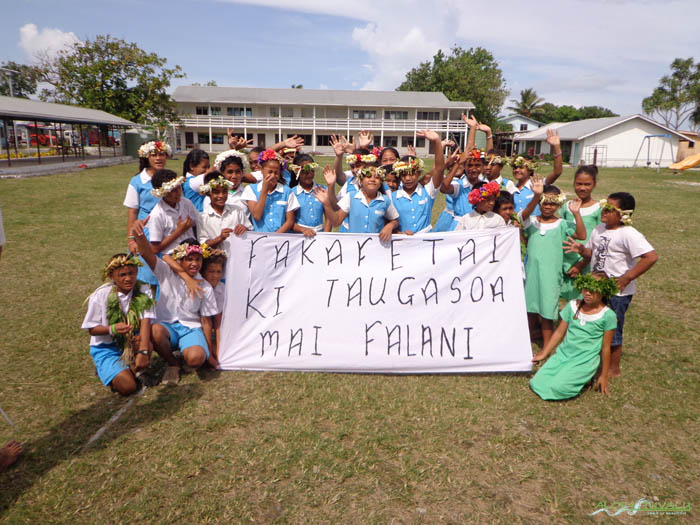
Fakafetai lasi lasi les garçons, vous avez assuré !
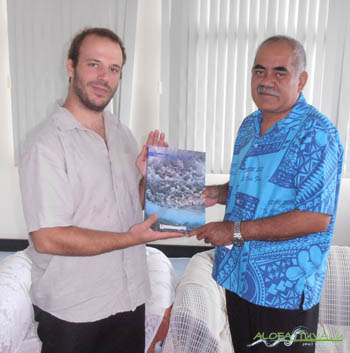
à Willy Telavi, Premier Ministre de Tuvalu
to Tuvalu Prime Minister Willy Telavi
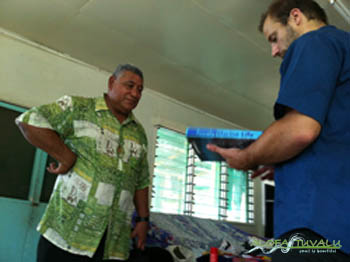
et à Apisai Ielemia, Ministre des Affaires étrangères et de l'Environnement de Tuvalu
and to Apisai Ielemia, Minister of Foreign Affairs and Environment.
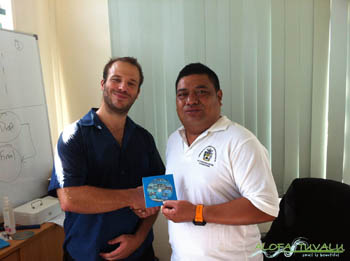
à Sam Finikaso, Patron du service des Pêches de Tuvalu
to Sam Finikaso, Head of Tuvalu Fisheries

et Uluao Lauti, représentant du Kaupule de Funafuti.
and Uluao Lauti, Funafuti Kaupule representative.
Précédent Suivant
